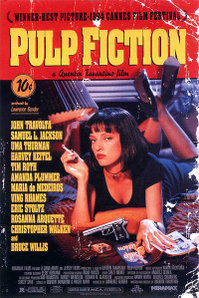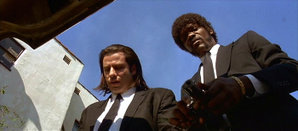Pulp Fiction
Pulp Fiction is a 1994 film directed by Quentin Tarantino and written by Tarantino and Roger Avary. more...
It was released to critical and public acclaim and is regarded by many as a milestone in movie history, helping to establish an ascendant independent film movement in the United States. Its fragmented storyline, eclectic dialogue, irony and camp influences, unorthodox camerawork, and numerous pop culture references have since colored countless movies.
The name of the film refers to the pulp magazines popular during the mid–20th century, known for their strongly graphic nature.
Reception and influence
Pulp Fiction is perennially found both on critics' lists (such as the AFI's One Hundred Years, 100 Movies List) and in popular rankings, placing consistently in the top 20 on the IMDB Top 250 List. In 2000, readers of Total Film magazine voted it the 18th greatest comedy film of all time. In 2005, Time.com named it one of the 100 best movies of the last 80 years. It won the 1994 Palme d'Or at the Cannes Film Festival and the Oscar for Best Original Screenplay. It was named Best Picture by the L.A. Film Critics Association and the National Society of Film Critics. Many critics, including Siskel and Ebert, have compared Tarantino's success with Pulp Fiction to that of Orson Welles after the release of his Citizen Kane.
The movie was moderately controversial at the time of its release, partly due to the graphic violence and partly due to its perceived racism, as Jackson and Travolta played moderately sympathetic characters who freely used the words "motherfucker" and "nigger" (along with variations of the word).
The success of Pulp Fiction spurred studios to release a slew of "copycat" films soon after that tried to duplicate the film's formula of witty and offbeat dialogue, an elliptical/non-chronological plot and unconventional storyline, and gritty subject matter. Most, if not all of these films, did not fare well at the box office and were dismissed by critics as inferior and derivative, though the raver film Go did receive critical acclaim, as did Christopher Nolan's Memento and Guy Ritchie's Lock, Stock and Two Smoking Barrels; the latter being a particularly successful transplant of the film's basic premise into the underworld of London.
The unconventional attitude of the movie, in particular its lack of a standard chronological structure, has often lead the film to be cited as an example of a postmodernist film.
Storylines
Half film noir and half black comedy, Pulp Fiction weaves through the intersecting storylines of Los Angeles gangsters, fringe characters, petty thieves and a mysterious attaché case. Following Quentin Tarantino's more traditional crime movie, Reservoir Dogs, the storyline is chopped up, rearranged and shown out of sequence, a technique borrowed from French nouvelle vague (New Wave) directors such as Jean Luc Godard (Bande à part) and François Truffaut and from low-budget American crime films such as Stanley Kubrick's The Killing (1956), Orson Welles' Touch of Evil (1958) and Don Siegel's The Killers (1964). The highly stylized and fluid action sequences and deadpan dialogue were inspired by Italian director Sergio Leone's famed spaghetti western pictures of the 1960s.
There are four main storylines in Pulp Fiction: Vincent and Jules; Mia Wallace; Butch Coolidge; and Pumpkin and Honey Bunny. All four are intertwined, although Vincent is the only one of these six characters to meet all of the five others during the film.
Vincent & Jules
Hitmen Jules Winnfield (Samuel L. Jackson) and Vincent Vega (John Travolta) head to a Los Angeles apartment to retrieve a briefcase that was involved in a failed deal for their boss, gangster Marsellus Wallace (Ving Rhames). They also have to kill Brett (Frank Whaley), the one who was supposed to have set up the deal, and his cohorts. The briefcase is a classic MacGuffin, whose contents are never revealed except indirectly as a glowing yellow light (a homage to the 1955 Robert Aldrich film Kiss Me Deadly and the 1984 Alex Cox project Repo Man). There has been speculation among fans that the case contains something of supernatural origin, possibly Marsellus' soul; see The mysterious briefcase.
Read more at Wikipedia.org



